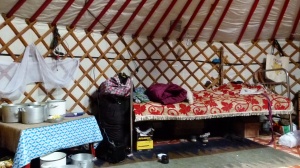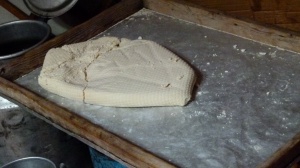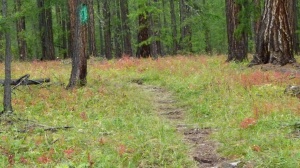Saying good-bye to Döltur
Today we move from the Döltur camp to Tolgoit which is about 50km away to the north. A the gate of Döltur, we receive a very kind farewell: Two ladies have a wooden bucket and a spoon. With the spoon they sprinkle a liquid (tea or milk) on the ground and wave, until we disappear. This is a Mongolian tradition. Waving until the guest disappears round the next corner is what we also do in Switzerland.
Grandma welcomes us in her ger
Pudje drives our car north and suddenly leaves the road heading uphill towards a lonely ger. Pagmajaw welcomes us. Aika translates. Pagmajaw is 65 years old, and we tell her that we are 62. She has retired and selected this nomadic life with her husband.
She has two daughters and four grand children. One daughter is studying in Ulanbaator and the second daughter works as a secretary in a national park.
She has 60 yaks and 200 sheep. Every morning she milks 16 yak animals, her forces do not suffice for more. We watch her boil about 20l of milk on the central oven. She carefully watches it, stirs it with a scoop and then pours the boiled milk into smaller pots. On the next day she will take the cream off the milk. She offers us bread and some of this cream which tastes like cream cheese. She also offers milk tea and explains that when preparing it, it is crucial to add water to milk and never milk to water.
Mushrooms are for animals
Next to the oven there are some brown lamella mushrooms. Pudje takes a hat of a mushroom, fills it with cream and roasts it in the wooden fire. Delicious.
Pagmajaw dries the mushrooms. Some hang on the side wall in the wooden grill that supports the ger. She feeds these mushrooms to the animals. Only occasionally they use mushrooms for their meals, mostly as spices. I tell her that we love to eat mushrooms, but have to look for them, while here you have to be careful not to step on them while walking, and she laughs.
The ger has all that is needed for life here
Pagmajew tells us that they move their ger four times per year. Construction and deconstruction is done in a few hours. They now load their material on a car to move from one place to the next. Before horses transported their household. The ger is not full with a lot of superfluous things. It has exactly, what is needed to live here.
There is a kitchen to the right of the entrance,
next a sack with tea leaf bricks,
next her bed,
near the bed a sack – she takes lamb skin out of it that she will use to insulate the house in winter. Next some boxes and the pots with the cooked milk.
The holy corner opposite the entrance is a sack and a rolled piece of silk fabric (yellow, green, blue and red). On the men’s side are his bed, the dried mushrooms and a wooden board with cheese that is ready to be cut and then dried.
In the wooden grid are hanging tools of daily life like sun glasses or a small book.
And also there are the signs of modern times
There is a satellite telephone that keeps on ringing (the daughters are calling), a mobile phone, a radio, a collection of cables, a sewing machine (she uses it to sew her traditional tuffed long jacket made out of dark red silk), an alarm clock, two batteries and a solar panel. Also this ger owns a car.
With a hearty good-bye we hand over our small gifts.
To the Tolgoit camp
We continue our way to the Tolgoit camp. We cross the Yankhi pass. Overlooking the pass are the slopes that had ben hurt by the Russian scientists. They needed a road. In front of us the lake, a gorgeous view.
Shortly afterwards we enter the Toilgot camp and move into a ger that has been heated so well that we open the door to breathe.
Reflecting our visit on the afternoon walk
After lunch we stroll amidst lark trees and mushrooms. We walk softly on the needles.
On the way back there is a nice view of the lake. Mushrooms, mushrooms, mushrooms, especially the red boletus (Rotfussröhrling)…
I imagine the risotto prepared with them! Ursula’s comment: “No nutritive value in mushrooms; this might be why the nomads ignore them.”
We reflect that Mongolia is transforming quickly. Half the population lives in towns now. The nomads use cars and motor cycles instead of horses. They use it to move gers and to guard their animals. At the elections four years ago, everybody came on horseback, and this year almost all came by car or motor bike.
Aika confirms that it might be true that the daughter of Pagmajew is studying in Ulanbaator, even if she might be forty years old. There are many older students. They receive a monthly salary of about USD 50, as the government thinks education to be important. Good marks lead to additional payments. “Some students go to the disco instead of studying”, she frowns.
We tell Aika about our flight that has been diverted to Edinburgh to take the army music band to some festival. She then tells me about the elections. The candidate of the opposition was in prison, until the elections were over, she says. There might be more capriciousness such as the black market burning down and now there is room for street construction. It is said that the shopkeepers could buy an insurance beforehand and were compensated. If this is true, there might be more room for change in Mongolia.












